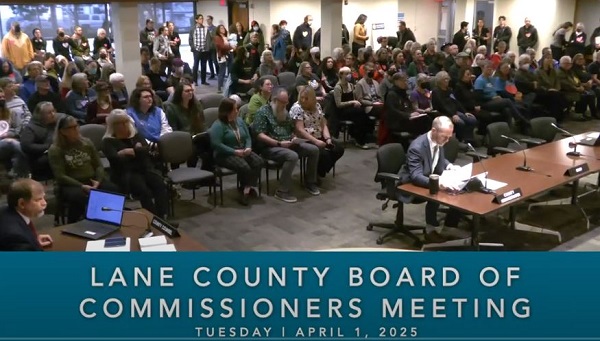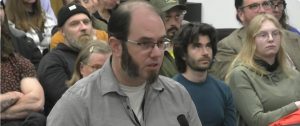Public comment: You’re gonna have to serve somebody
8 min read
Presenter: While reflecting on public comment April 1, Lane County Commissioner Pat Farr:
Commissioner Pat Farr: I’d like to respond to the passage from Matthew… If I wanted to respond to everybody who spoke this morning, I’d have to talk about trans medical care, national politics, light pollution, Bob Dylan, Eugene as a sundown town, and personal attacks on individuals.
Presenter: Here’s a recap of those comments from Commissioner Farr’s list. Among many addressing trans medical care April 1, Elliott Harwell and Nicole Yell:
[00:00:30] Elliott Harwell: My name is Elliott Harwell for the Trans Alliance of Lane County. Over the past several weeks, members of TALC have done what any good civic-minded citizen is supposed to do.
[00:00:40] We have politely petitioned our local government to take specific concrete steps to better protect the county’s trans and undocumented citizens. I would like to thank our allies, especially the Jewish community of Temple Beth Israel, for joining our efforts.
So imagine my surprise when I learned on March 14 that Commissioner (David) Loveall, who is also the founder of Three Sixteen Ministries, posted on his ministry’s Facebook how he had had to listen to public comments from, and I quote, ‘rebellious, God-skewed and gender-confused people.’
[00:01:13] As a trans woman, I am angered that my commissioner would dismiss me and my neighbor’s concerns as being ‘gender-confused.’ I am angry that my commissioner, a professed Christian, would call his Jewish neighbors ‘God-skewed.’ But most of all, I’m angry that my commissioner would call his constituents ‘rebellious’ for respectfully addressing him in the public forum, as is our right.
[00:01:35] Nicole Yell: Hi, my name is Nicole Yell. In case you’re not familiar with this term, ‘gender-affirming care’ is treatment for a diagnosis of gender dysphoria, which impacts many transgender and nonbinary people. Gender dysphoria happens when a person’s gender identity does not match their sex assigned at birth.
[00:01:50] Treatments include social, psychological, behavioral, and medical interventions. Every major medical and mental health organization, including the American Medical Association, the American Academy of Pediatrics, and the American Psychological Association recognizes that is medically necessary to support people in affirming their gender identity.
[00:02:10] Without this care, kids like mine are more likely to struggle with suicidal ideation, suicide attempts, depression, anxiety, and other mental illnesses, as well as drug addiction and homelessness. Not to mention violence and discrimination when they do not pass socially as the gender they identify with.
[00:02:26] Most importantly, just like any other form of health care, gender-affirming care helps transgender and nonbinary people live safe and healthy lives.
[00:02:34] Presenter: Discussing national politics, Richard Greene:
[00:02:37] Richard Greene: I’d like to encourage you to take a stand on respecting the sanctuary laws and say Lane County is. It’s a very symbolic act in many ways, but you may not always have that liberty.
[00:02:50] And I just want to add a little historic perspective on the Dred Scott decision. In the ruling, the Supreme Court stated that enslaved people were not citizens of the U.S. and therefore could not expect any protection by the federal government or the courts. Does that sound familiar to some arguments currently?
[00:03:09] And the Dred Scott decision continued to state that the Constitution treats this race ‘as persons whom it was morally lawful to deal in as articles of property (and to hold as slaves).’
[00:03:24] I hope you all find that morally repugnant, that kind of thinking, that kind of language. But this Supreme Court decision enjoined boards like this, communities like ours, to assist the federal government in capturing and deporting fugitive slaves from free land to slave land.
[00:03:47] This law said morally, it was legal to treat them as property. Morally. What a morally repugnant statement that is.
[00:03:58] Presenter: With comments on national politics, Robyn McLeod:
[00:04:01] Robyn McLeod: My name is Robyn McLeod. I read a manual that had recently been declassified called the OSS Manual on (Simple) Sabotage. It was written in World War II by the organization that would later be turned into the CIA for operatives who were trying to organize cells against the Nazis.
[00:04:24] I thought about it and I realized that everyone has a skill set. Everyone has something that they know how to do, and one of the most difficult things to learn is how to make the machines stop running when they need to stop running.
[00:04:39] The machines right now are being turned to grim purpose. ‘The center cannot hold,’ ‘Things full apart,’ as (William Butler) Yeats put it, and all that stuff about grim and terrible intensity on the part of the worst of us.
[00:04:55] Try to learn how to make the machines stop when they need to stop. The wealthy and powerful do not care about people like me, and you don’t have much time to learn how to make things stop when they need to stop. And your skills can be part of that, if you learn how to liberate them from what they’re doing now.
[00:05:29] Presenter: Discussing light pollution, Misty Bowman:
[00:05:32] Misty Bowman: My name is Misty Bowman. I’m a Dark Sky Oregon advocate. And while I am here to support my trans brothers and sisters, mainly, I’m here to discuss light pollution. Dark Sky International estimates light pollution costs every man, woman, and child in America $12 a year. In Lane County, that’s over $4.5 million a year.
[00:05:53] Presenter: Reflecting on Bob Dylan, Bill Compton:
[00:05:55] Bill Compton: Did you know that in 1979 Bob Dylan, one of my favorite rock stars, kind of went weird, but in that he won a Grammy for being the top male vocalist and he kind of went off the rails when he wrote an album called Slow Train Coming, and the song that he actually won that for was Gotta Serve Somebody.
[00:06:27] I was tempted to sing to you this morning. How many would like me to sing to you this morning? Actually, I’m going to save you. But let me just read something that he wrote from the song:
‘You might be a preacher with spiritual pride—’
[00:06:44] Bob Dylan: Maybe a city councilman taking bribes on the side. Maybe working in a barber shop, you may know how to cut hair. You may be somebody’s mistress, maybe somebody’s heir. But you’re gonna have to serve somebody, yes, you’re gonna have to serve somebody. (Serve somebody.) Well, it may be the devil or it may be the Lord, but you’re gonna have to serve somebody.
[00:07:16] Bill Compton: ‘Well, it may be the devil, and it may be the Lord, but you’re gonna have to serve somebody.’
[00:07:21] You know, that song resonated with me as a teacher, as you all know, serving Lane County for many, many years, and still serving Lane County. It’s so important to understand your audience, your clientele. My clientele was your children. My children. Yes, ‘we gotta serve somebody,’ each one of us. Thank you for serving the board.
[00:07:44] Thank you for serving us for me. As I said, I continue to serve Lane County and I’m thankful you are serving Lane County. And you’re listening.
[00:07:53] I know that many citizens that I’ve spoken to have recently about the March 11 meeting, in which the Land Management Department asked for a 22.5% increase in department permit fees…
[00:08:08] Presenter: Discussing whether Eugene is a sundown town, David Igl:
[00:08:12] David Igl: David Igl. I challenge commissioners to provide primary source documentation to support the unsupportable narrative that is being promoted. For example, please provide a citation to an ordinance or other support for the statement that Eugene was a sundown town. Eugene was not a sundown town.
[00:08:29] Presenter: Discussing personal attacks on individuals, Maia Burk:
[00:08:34] Maia Burk: I want you to think about yourselves and the safety of the other people in this community. Because attacks on marginalized groups such as trans people, such as immigrants, are test cases. They’re test cases for attacks on people in the community, period, who are inconvenient.
[00:08:58] We have already seen people pull up in black vans to take away immigrants with inconvenient opinions.
[00:09:09] If you stand for attacks on trans people, on our healthcare, on immigrants, by the time winter comes around, it could be your friend Steve with weird opinions, who talks too loud. This has to stop, but it won’t unless you stop it.
[00:09:25] Presenter: And the Gospel according to Matthew:
[00:09:28] Emily Searlait Cluck: My name is Emily Searlait Cluck. I am a transgender woman and by the amazing grace of God, I’m a devout Christian.
[00:09:36] I would like to start this message brief briefly by reading from the Gospel according to Matthew.
[00:09:44] Then the king will say to those at his right hand, ‘Come you who are blessed by my father, inherit the kingdom prepared for you from the foundation of the world. For I was hungry and you gave me food. I was thirsty and you gave me something to drink. I was a stranger, and you welcomed me. I was naked and you gave me clothing. I was sick and you took care of me. I was in prison and you visited me.’
[00:10:13] Then the righteous will answer him, ‘Lord, when was it that we saw you hungry and gave you food or thirsty and gave you something to drink? And when was it that we saw you, a stranger and welcomed you or naked and gave you clothing? And when was it that we saw you sick on prison and visited you?
[00:10:34] And the king will answer them: ‘Truly, I tell you, just as you did it to one of the least of these brothers and sisters of mine, you did it to me.’
[00:10:46] I’m asking, I’m asking you all. If any of you all are Christian, follow the amazing agape of our Lord and Savior, have mercy upon us as trans people and as immigrants. Hold the line against the unholy Gestapo who are after us.
[00:11:06] And I say this in all solidarity with our Jewish comrades who welcomed the wandering Aramean and to our Muslim comrades who follow the examples of the Holy Prophet Muhammad. I ask you all in my perspective as a devout Christian, protect us.
[00:11:23] Presenter: Commissioner Pat Farr:
[00:11:24] Commissioner Pat Farr: I’d like to respond to Emily Searlait Cluck, talked about the passage from Matthew about, ‘I was hungry and you fed me,’ and the king responded, ‘Truly I will tell you, whatever you did for one of the least of these brothers and sisters of mine, you did for me.’
[00:11:38] Now, who am I speaking to when I’m saying this? To people who really are professed to be Christians, to people who really profess to be in service to others. Who are you in service to? Well, you’re in service to the people who need service. And that is what we have to do.
[00:11:55] That passage goes on to say, ‘Depart from me you who are cursed, for I was hungry and you gave me nothing. I was thirsty, you gave me nothing. As a stranger you didn’t invite me in. I needed clothes and you did not clothe me. I was sick and in prison you did not look after me.’
[00:12:11] We don’t want to be that. We are not that. We are respondent to people’s needs. And the sooner we can make that announcement, the sooner we can profess it from the rooftop, then the better off everybody is.
[00:12:23] Presenter: During public comments April 1, Lane County commissioners are asked to serve the least among us.



